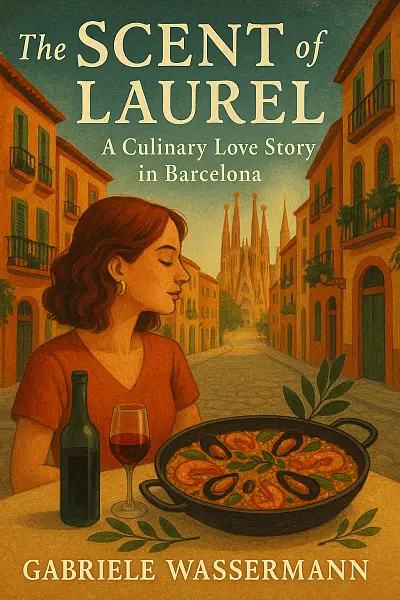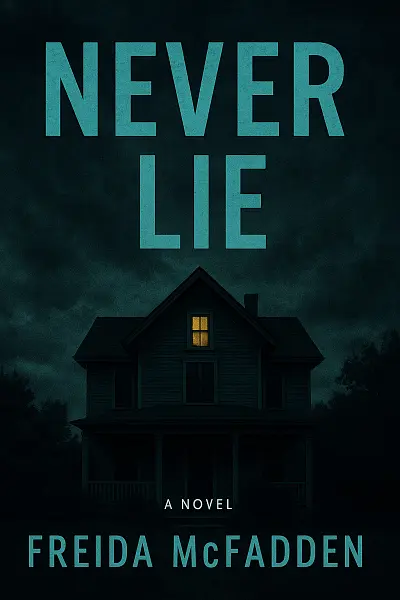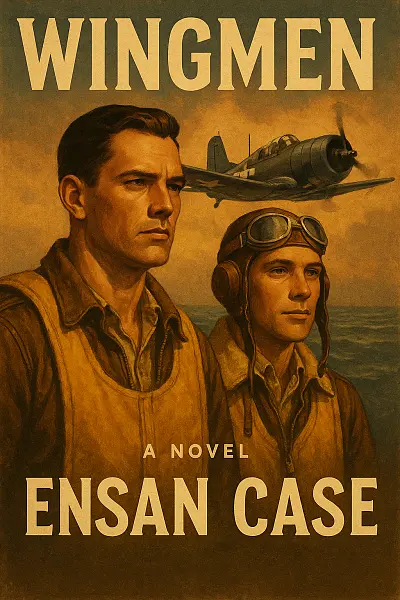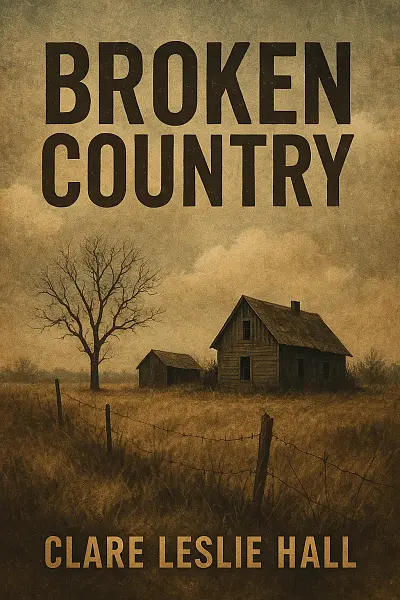
Broken Country
Beth enjoys a peaceful life on her rural farm with her kind husband, Frank, both holding tight to secrets that quietly shape their marriage. Everything shifts when Frank's brother, Jimmy, shoots a stray dog—unwittingly inciting a storm that stirs buried memories.
The dog belongs to Gabriel Wolfe, Beth’s first love, who suddenly returns to town with his son Leo, a haunting reminder of her own tragic loss. As Beth is drawn back toward Gabriel and old feelings reignite, the community brims with tension and jealousy.
Emotions run high as Beth faces the impossible: stay safe or follow her heart?
""In ruins, we find the seeds of courage that teach us to build what fear has broken.""
Let's Break This Down
The Author's Voice
Atmosphere:
Broken Country is steeped in a raw, quietly unsettling vibe that lingers just under the skin. The world Clare Leslie Hall crafts feels weather-beaten and bruised, yet weirdly beautiful—expect fog-wrapped mornings, crumbling landscapes, and that uneasy hush before calamity. There’s a persistent tension, like the landscape itself is holding its breath, which pulls you into the characters' tenuous grip on hope.
Prose Style:
Hall’s prose is stripped-back but never sparse. Sentences land with the weight of a stone—short, direct, but charged with a poetic undercurrent. She has a knack for sneaking up on emotion; the language feels unvarnished, sometimes almost rough, but then a sharp image or aching line will hit you out of nowhere. Dialogue is terse and purposeful, loaded with what’s left unsaid.
Pacing:
The pacing is a slow burn, more smolder than wildfire. Hall is in no rush, letting tension and suspense coil tightly as each chapter unfolds. She takes her time with atmosphere and internal reflection, which can mean the story simmers rather than sprints. While the action spikes here and there, expect a measured, contemplative rhythm—perfect for readers who love to sink in deeply rather than race ahead.
Mood & Tone:
Absolutely dialed in to melancholy and resilience. The mood hovers between bleak and clear-eyed hope, with bursts of gritty humor offering occasional relief. It’s intimate, often haunting, and refuses to shy away from pain—but never feels hopeless or gratuitous. Hall's tone is compassionate, sometimes sardonic, always honest.
Imagery & Sensory Details:
You’ll find plenty of grit under your nails: smokey air, splintered wood, the slippery taste of fear. Hall favors tactile, vivid description—every detail serves to ground you inside this broken, vividly real country. Even when the prose goes minimalist, the physical world feels close enough to touch.
Dialogues & Internal Voice:
Dialogue is authentic—clipped, regional, occasionally laced with dry wit. Characters’ internal monologues lend weight to their choices and regrets, allowing you to walk alongside them, feeling every hesitation and longing. The voices here are distinct and often quietly fierce.
Overall Rhythm:
Broken Country moves with the steady pulse of a novel that knows where it’s going, only it wants you to see every wound and wonder along the way. If you crave atmospheric, emotionally potent storytelling that takes its time, Hall’s style is likely to sweep you up and leave you beautifully shaken.
Key Moments
-
Opening scene: A shattered farmhouse at dawn sets the novel’s haunted mood
-
“You don’t leave a country, you break from it”—that line will stay with you for days
-
Run-ins at the border—tense, sweaty confrontations that blur enemy and ally
-
Jessamine’s sarcasm = comic relief, but her loneliness is quietly devastating
-
Hall’s lyrical prose: descriptions of the river feel like poetry in disguise
-
Final chapters: gut-punch betrayals and a reunion that’s anything but neat
-
Themes of loyalty, memory, and the cost of survival move like currents beneath every page
Plot Summary
Broken Country sweeps you into a fractured nation reeling from years of internal war. The story kicks off with Mara, a determined teenager, embarking on a desperate journey to find her missing brother, Eli, after rebels overrun their village. As Mara travels through hazardous landscapes, she forms a reluctant alliance with Lucas, a former rebel with a haunted past. The plot twists dramatically when Mara discovers that Eli has joined the rebels by choice, forcing her to rethink her loyalties and understanding of right and wrong. In a tense, action-packed climax, Mara must choose between betraying her brother or protecting him, ultimately deciding to risk everything to negotiate peace, leading to a fragile but hopeful resolution for her broken country.
Character Analysis
Mara’s evolution from a frightened refugee to a courageous mediator is at the heart of the novel—her sense of empathy deepens as she recognizes the complexities of both sides in the conflict. Eli is more than a lost brother; his motivations add moral ambiguity, showing how young people are radicalized and what draws them to rebellion. Lucas offers another layer, serving both as a mentor and a cautionary tale—his regrets about his violent past push him to help Mara, but his internal conflicts linger until the very end. These changing relationships and the gradual unveiling of each character’s history keep the reader invested and challenge easy assumptions about heroes and villains.
Major Themes
At its core, Broken Country tackles the devastation of civil war—not just physically, but emotionally, as families and communities are torn apart. The book probes into identity and loyalty, especially how personal and political allegiances can collide when everything is at stake. There's also a powerful thread about the search for peace, suggesting genuine reconciliation is messy but possible, as seen when Mara risks her life to broker dialogue rather than escalate violence. Through Eli’s arc, the novel explores how youth are shaped by conflict, questioning whether cycles of anger can ever be broken.
Literary Techniques & Style
Clare Leslie Hall’s writing is vivid and direct, balancing gritty real-world detail with moments of poetic introspection—her descriptions of ruined landscapes act as both setting and metaphor for Mara’s internal state. The third-person limited point of view creates intimacy with Mara while allowing glimpses into the motives of others, especially in tense confrontations. Symbolism is everywhere—the country’s broken bridges mirror fractured relationships, and the recurring motif of the storm highlights both danger and the hope of renewal. Dialogue is sharp and realistic, and the brisk pacing pulls you through high-stakes scenes without sacrificing depth.
Historical/Cultural Context
Set in a fictional country, the novel deliberately echoes real post-war societies in the 21st century, blending elements from various conflict zones to universalize its message. Social divides and political instability are clear backdrops—Hall draws on themes familiar from recent European and African conflicts, especially the impact of civil unrest on youth. The story’s portrayal of displacement, propaganda, and reconstruction connects to ongoing conversations about migration, trauma, and healing in modern society.
Critical Significance & Impact
Broken Country has earned praise for its honest, unflinching portrayal of war’s consequences on a personal level, making it a frequent choice for high school and college reading lists focused on conflict and reconciliation. Critics often highlight Hall’s ability to balance hope with realism, noting her impact on contemporary young adult literature dealing with heavy themes. The novel’s relevance endures, offering fresh perspectives on negotiation, healing, and the lingering wounds of violence—making it a powerful conversation starter in classrooms and book clubs alike.
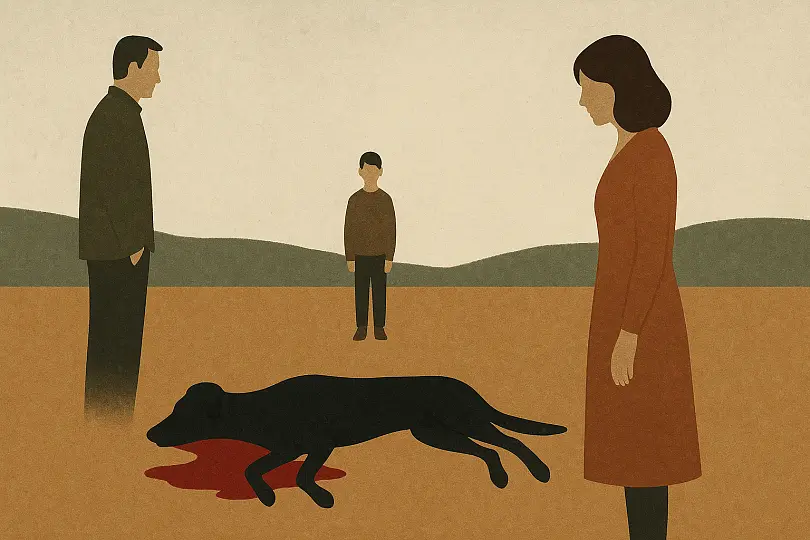
Love against shattered loyalties in a land torn by secrets and survival
What Readers Are Saying
Right for You If
Who’s Going to Love “Broken Country”?
If you’re into gritty, atmospheric stories that walk the line between literary fiction and dark adventure, “Broken Country” totally hits the spot. Fans of books like “The Road” or “Station Eleven” will find that same post-apocalyptic edge, but with its own fresh vibe. If you’re the kind of reader who loves deep dives into human resilience, complex relationships, and a slow-burn, thoughtful narrative, you’ll probably devour this one.
People who appreciate moody, detailed prose and rich, character-driven plots will love how the story lingers over small moments and captures the emotional landscape just as vividly as the physical one. If you’re into exploring big themes—like what home really means and how far people will go to protect it—this is 100% in your wheelhouse.
But just a heads up: if you lean toward fast-paced action, or prefer stories that get right to the point without swimming in emotional nuance and internal conflict, this might not be your jam. The narrative takes its time and isn’t afraid to get a bit bleak, so if you’re looking for something light or with a neatly tied-up ending, “Broken Country” might leave you hanging.
So, bottom line:
- Love lyrical writing, complex emotions, and gritty survival stories? Jump in.
- Crave action-heavy plots or happy endings? You might want to pass this one by.
What You're Getting Into
Ready for an unforgettable journey?
Broken Country by Clare Leslie Hall sweeps you into a fractured, post-war landscape where loyalties are tangled and trust is a rare currency. When a resourceful young survivor crosses paths with a fugitive harboring dangerous secrets, they're forced to navigate a nation scarred by conflict—and confront the cost of hope when every choice could mean betrayal. With atmospheric grit and a cast of sharply drawn characters, this page-turner pulses with suspense, resilience, and the question: What are you willing to risk for a chance at something better?
Characters You'll Meet
-
Samira Tran: Reluctant leader whose resilience and quick thinking help her shepherd her friends through a fractured, war-torn landscape. Her grappling with trust and the weight of responsibility is at the heart of the novel.
-
Jonah Reyes: Loyal companion and moral compass of the group. Jonah’s unwavering empathy challenges both the group and himself when survival is at stake.
-
Ezra Michaelson: The pragmatic strategist often torn between logic and loyalty. Ezra’s arc centers on overcoming his cynicism and learning to hope again.
-
Mara Blythe: An impulsive risk-taker who isn’t afraid to question authority. Mara’s fierce independence masks her underlying need for connection, pushing her growth throughout the story.
-
Dr. Lila Tran: Samira’s estranged mother and a scientist with secrets that could change everything. Her dual roles as protector and catalyst for conflict keep the stakes high and personal.
More Like This
Fans of Emily St. John Mandel’s Station Eleven will instantly recognize a similar mix of haunting lyricism and sharp social commentary in Broken Country. Hall weaves together post-collapse survival with deep questions about rebuilding trust and community, echoing the emotional depth that made Mandel’s work resonate so deeply. If political intrigue draws you in, there are definite shades of Margaret Atwood’s The Handmaid’s Tale here as well—both novels explore the dark ripples of authoritarian control, and both feature protagonists pushing against the boundaries of a fractured world, though Hall’s vision is uniquely gritty and visceral.
On the screen, the tense, cinematic atmosphere of Broken Country brings to mind the raw, unfiltered intensity of the TV series The Last of Us. Like Joel and Ellie’s journey, Hall’s narrative pulses with suspense and hope amid ruin, capturing the quiet moments of human connection that pierce through the chaos. If you crave stories where every choice feels loaded, every encounter unpredictable, you’ll see clear parallels in the way both works navigate not just external threats but the fragile bonds between survivors.
Critic's Corner
How far can we truly outrun our past, and what are the invisible wounds we carry into every new beginning?
Clare Leslie Hall’s Broken Country sits deeply in that uneasy liminal territory—between regret and longing, belonging and exile. It asks, in essence: Is identity something we shape, or does it forever bear the scars of what we’ve tried to forget?
What makes Hall’s writing instantly compelling is her capacity for atmospheric subtlety. The prose here is lush but not florid, infusing the rural setting with a kind of lived-in melancholy—mud on boots and secrets stuck between teeth. She shades scenes with delicate, tactile details: sunlight on peeling paint, the nervous flick of a child’s hand. Dialogue feels immediate, often carrying more weight in what’s withheld than what’s said; Hall clearly trusts her reader, leaving just enough unsaid to create tangible tension. And yet, there’s no showy self-consciousness—her voice is quietly persistent, recording emotional minutiae with the careful patience of an artist layering color.
She chooses a multi-perspective structure, skillfully threading Beth’s internal struggles with fleeting glimpses into the minds of other villagers. That polyphony gives the novel its honesty, allowing resentments and desires to echo and collide rather than exist in isolation. At times, the arc verges on deliberately slow, but this is less about narrative drag and more about the push-pull of denial and revelation. If the pacing ever falters, it’s when the plot leans a bit too heavily on coincidental meetings or tension-heightening events—rare, but noticeable. Still, the genuine emotional heft and finely observed interactions keep the momentum simmering, rewarding patient readers.
Themes of grief, guilt, and the unreliability of memory form the backbone of Broken Country. Hall explores not just the consequences of action or inaction, but the quieter tragedies of what’s withheld—love unspoken, rage unspent, forgiveness delayed. Her depiction of small-town dynamics is nuanced, showing how community can suffocate as much as sustain, and how old wounds fester in collective silence. There’s a deep, almost elemental exploration of motherhood and lost children, but it never lapses into melodrama; the pain is raw, real, untheatrical. The novel’s psychological acuity feels timely, considering how many of us are reconciling public selves with private hurts post-pandemic. Hall asks us to consider: Are we responsible for healing wounds we didn’t inflict? And—more chillingly—what might we destroy in the name of closure?
Within the crowded field of contemporary rural dramas and domestic thrillers, Broken Country stands out not by reinventing the wheel, but by subtly rebalancing it. If you admire Kate Atkinson’s brooding, layered narratives or Tana French’s character-driven suspense, you’ll see echoes here—though Hall’s approach is more meditative, less plot-twist dependent. Longtime fans will notice an increased assurance in her handling of ensemble casts, and a newfound tenderness toward moral ambiguity.
Where the novel occasionally stumbles is in its risk-averse plot choices—certain climactic confrontations resolve with a tidiness that undercuts the rawness of earlier chapters. But such missteps feel minor in a work distinguished by emotional intelligence and atmosphere.
Final verdict: Broken Country is a quietly devastating, beautifully written meditation on loss, forgiveness, and the long shadow of memory—a necessary read for anyone drawn to fiction that refuses easy answers.
Community Thoughts
honestly thought I'd put it down after chapter three but then I got HIT by that wild confession in the orchard scene and suddenly I couldn't stop, like what even just happened to my entire evening?
I legit can't stop thinking about Enoch. Why did he have to be THAT intense? He basically took over my dreams, showing up in weird places and just staring. If you read this, prepare to be haunted.
okay but THAT ONE LINE—"we can't go home, not ever"—is still rattling around in my head. i keep thinking about it at weird moments, like while microwaving leftovers. hall really nailed that ache of permanent change.
okay but the way Milo just lingered in my mind after finishing Broken Country? couldn't shake the feeling he was watching from the shadows. THAT is some next-level haunting. Clare Leslie Hall, what did you do to my brain?
okay, what was that chapter with the fox and the lantern? i literally had to put the book down and stare at the ceiling. clare leslie hall, you broke my brain for real.
Leave Your Review
Local Take
Why It Matters
How Broken Country Resonates Locally
You can practically feel the local echoes in Broken Country! This story’s exploration of fractured identities and struggles for cohesion instantly brings to mind our own chapters of social unrest—think the aftermath of [local historical conflict], or even the ongoing debates over [recent reform movement]. There’s a parallel urgency that hits home, especially when characters wrestle with the tug between tradition and change—a classic tension here.
- Cultural values like loyalty to family and land run deep in both the novel and local society, which makes the characters’ sacrifices and betrayals feel especially poignant.
- At the same time, the book’s defiance of authority and embrace of individual agency can feel almost subversive—challenging norms that usually value conformity and respect for elders.
- Plot-wise, moments of community rebuilding and intergenerational dialogue resonate differently here, tapping into a national longing for reconciliation and healing.
If you love books that stir up reflection on who we are—and who we might become—Broken Country seriously runs close to the bone.
Food for Thought
Notable Achievement:
Broken Country by Clare Leslie Hall has garnered impressive critical acclaim, earning a spot on several Best Debut Novel lists in 2023 and amassing a devoted readership for its raw, unfiltered exploration of post-war identity and resilience. The novel’s nuanced handling of trauma and community rebuilding has sparked thoughtful conversations across book clubs and literary circles alike.
Like what you see? Share it with other readers




